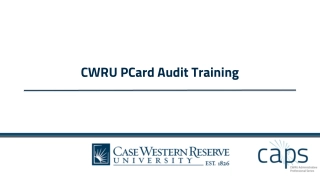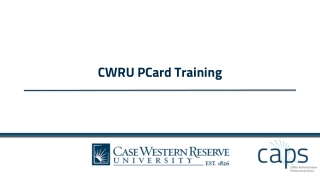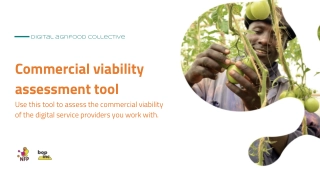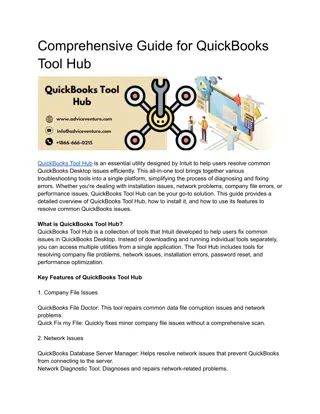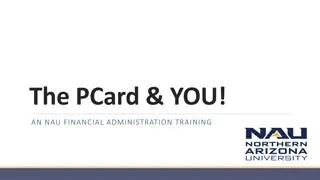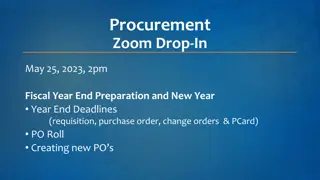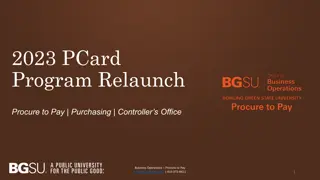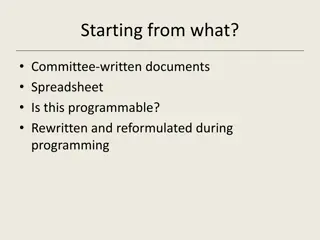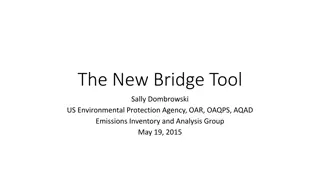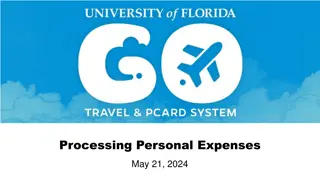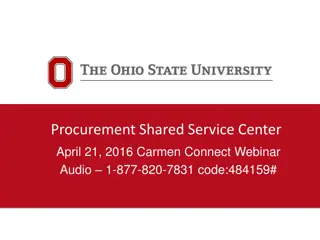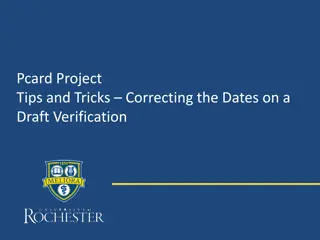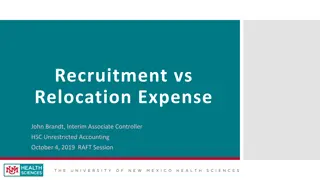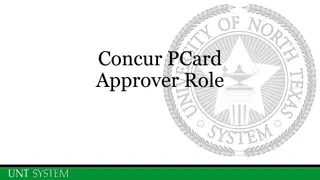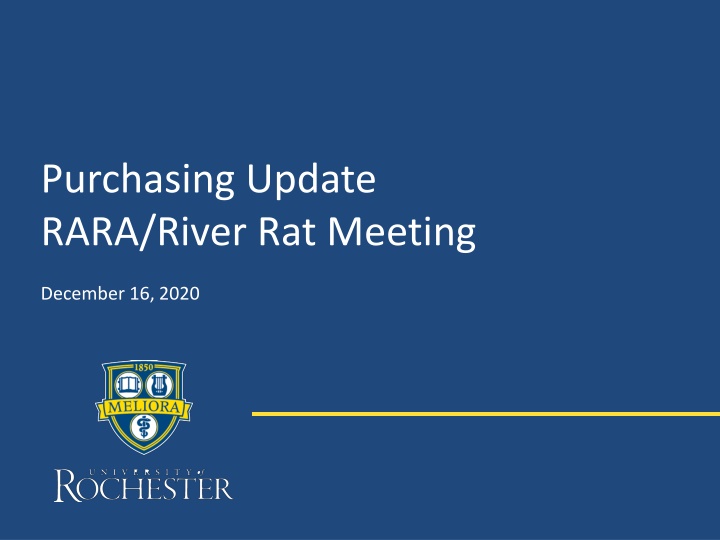
University Pcard Policy Updates: Increasing Limits and Introducing New Card Types
The University Pcard policy is updated with increased single purchase limits, the introduction of new card types for events and group travel, and stricter consequences for policy violations. Cardholders must adhere to the changes effective January 1, 2021. Detailed information on the updates and procedures are provided in the announcement.
Download Presentation

Please find below an Image/Link to download the presentation.
The content on the website is provided AS IS for your information and personal use only. It may not be sold, licensed, or shared on other websites without obtaining consent from the author. If you encounter any issues during the download, it is possible that the publisher has removed the file from their server.
You are allowed to download the files provided on this website for personal or commercial use, subject to the condition that they are used lawfully. All files are the property of their respective owners.
The content on the website is provided AS IS for your information and personal use only. It may not be sold, licensed, or shared on other websites without obtaining consent from the author.
E N D
Presentation Transcript
Purchasing Update RARA/River Rat Meeting December 16, 2020
Pcard Policy Updates The Pcard Policy has been updated and the new approved changes will become effective January 1, 2021. Highlights of the policy changes are listed below: The standard Pcard single purchase limit has increased from $2,500 to $5,000 This is to bring the University more in line with peer organization Pcard Program limits (e.g. Cornell, RIT, University of Wisconsin, etc.) For existing cardholders, this change will be strictly voluntary and opt-in. Existing users will have to request their cards be updated to reflect the new acceptable limits. It will not be updated automatically. Brand new cards/users will have this limit enabled automatically unless they specifically request a lower limit. 2
Pcard Policy Updates Two additional card types have been developed: Event Card to facilitate payment of University business event purchases Group Travel Card to facilitate travel of larger groups on University business (i.e. Study Abroad, Athletics, etc.). Only card with ability to withdraw cash (to eliminate the need for groups to carry large amounts of cash on University business trips) Given the unique nature of many Event or Group Travel purchases, both of these card types have no single purchase limit. Users would be able to theoretically charge up to the defined monthly limit for a single purchase, as many of those types of purchases would exceed the standard Pcard limit Because of the much higher potential limits enabled on these two cards types, departments requesting access to them would be required to provide detailed written justification. Current restrictions related to University business travel are still in effect until further notice. Departments seeking a Group Travel Card will need to obtain written approval from their Senior Leadership before it will be issued Note: Users cannot hold more than one type of card. (e.g. a person with a standard Pcard cannot request any other card type as well) 3
Pcard Policy Updates Stricter consequences have been developed for Pcard Misuse and Policy Violations Minor violations of policy may result in temporary card suspensions ranging from 10-30 days. Some examples of what are considered minor violations of policy are listed below: Splitting transactions or otherwise exceeding the Pcard single purchase limit without a written exception from the Pcard Administration team Repetitive instances of purchasing from Restricted use categories without a written exception from the Pcard Administration team Failure to reconcile & approve Pcard activity within required timeframe (see later on in this newsletter for updated Pcard procedures related to Workday) Major violations may result in card termination and inability of cardholder to hold card in the future. Some examples of what are considered major violations of policy are listed below: Allowing another individual access to/use of your Pcard, or otherwise lending, sharing, or delegating use of your Pcard to another individual Use of Pcard or related tools for personal use or benefit (e.g. accidental or willful use of Pcard for a personal purchase, or use of Amazon Business account for both work and personal purchases, even if personal card is used) 4
Pcard Policy Updates Pcard Forms new forms added and existing forms revised Pcard Authorization Request Form Pcard Annual Recertification Form Pcard Change Form (newly developed) For any sort of change/maintenance to a user s Pcard Pcard Exception Form (newly developed) Utilized to obtain special permission to use Pcard for otherwise restricted activity (e.g. order over single purchase limit, purchase from restricted use list) Pcard Missing Receipt Form (newly developed) To be used when a user is unable to obtain or misplaces a receipt or other supporting backup to substantiate a Pcard purchase 5
Pcard Policy Updates The Pcard Acceptable and Restricted use list has been expanded, with clarifying comments added. Purchases may fall into three (3) categories Approved Use where Pcard is considered to be the best practice purchase/payment method for individual transactions up to $5,000 Caution Use certain categories that may be situationally acceptable or restricted depending on the circumstance Restricted Use prohibited on Pcard because the category requires additional Procurement review for reasons of tax, insurance, organizational risk, contractual obligations, or other regulatory issues. Best practice alternatives to Pcard are included within the new Policy for restricted use categories. 6

